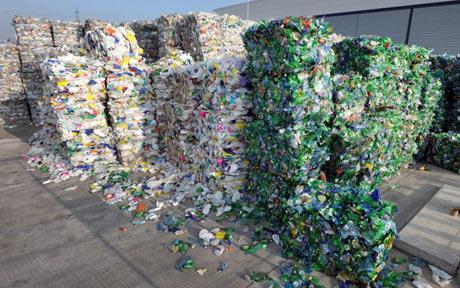 John Pelech is in the business of making something out of someone else’s nothing. Pelech is the owner of Poly Recovery, a plastic processing
John Pelech is in the business of making something out of someone else’s nothing. Pelech is the owner of Poly Recovery, a plastic processing
and recycling company that set up shop at Pease International Tradeport more than a year ago. The Portsmouth native said business has never been better.
Situated in a 20,000-square-foot facility on Aviation Avenue, Pelech and his team specializes in paper/plastic processing and reclamation programs.
With long-term relationships with various molding, textile, packaging and end-user organizations throughout New England, Pelech said his company is beginning to find its niche in the market.
Pelech said the business pays particular attention to the local community, which he said helps not only his company, but helps his clients reduce their carbon footprints. The result is substantial savings on labor costs, transportation and other resources, as well as the benefits of protecting the environment and preserving the bottom line.
The effort began nearly three years ago, when Pelech said he was working in finance and learned of the incredible amount of waste coming out of paper mills. Pelech said he learned that five paper mills were each generating 20 tons of waste a day.
Instead of sending that waste to the landfill, Pelech said, he devised a process that separated the paper pulp and plastic waste, and allowed for the paper pulp to be sold back to the paper mill and the plastic could be sold off as well.
But without enough capital to start the large-scale operation, Pelech said he instead decided to focus his efforts in the community where he grew up.
“My grandfather was mayor of Portsmouth,” he said. “I was raised a Portsmouth kid. I wanted to work with it here.”
Locally, Pelech said he learned that much of the waste generated from manufacturing companies ends up making its way south to the Carolinas.
But unlike the big companies that concentrated efforts on transporting the products out of town, Pelech said he decided to go with the model of “one company, one truck, one solution.”
“Where others are brokers or middlemen, Poly Recovery owns its own state-of-the-art processing center and warehouse facility (and) trains and employs its own staff,” he said.
“More important, all material purchased by Poly Recovery gets analyzed, lab tested and processed at its own facility. Finally, the material gets manufactured into new products locally.”
A self-described “plastic nerd,” Pelech said his business also focuses on other materials found in large industrial manufacturing facilities, such as cardboard, office paper and pretty much anything a company is willing to throw away.
“You throw it all into one truck, and when that truck gets full, we get a phone call, we pick it up and unpack it,” he said. “We take everything. I’ve got companies that fill the trucks with cardboard, mop buckets, metal and mop handles.”
As a general rule, Pelech said he prefers to do business within a 100-mile radius. Currently, Poly Recovery does business with three of the 10 largest manufacturing companies in New Hampshire, he said.
One of the company’s biggest clients happens to be Foss Manufacturing, which Pelech said is only 10 miles down the road. The process involves taking the packaging scrap from other local companies and processing it and then sending it to Foss, which in turns transforms the plastic waste into a polyester fiber that is used for carpet and trunk liners for cars and clothing marketed by major clothing companies.
“We try to keep everything local,” Pelech said. “Ultimately it’s our waste, we might as well keep it here.”
Another component of the business is education, said Mike Mooney, sales manager and chief recycler.
Mooney and Pelech said showing their clients the chain of where waste comes from and where it goes is an important part of the process.
“We like to create a lifeline for them,” Mooney said.
Source : www.seacoastonline.com







